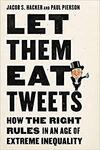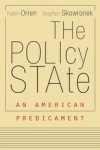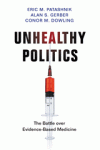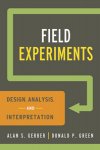Publications
About Our Publications
On this page you will find a list of publications by ISPS Affiliates, including peer-reviewed journal articles, policy briefs, and working papers.
When possible, Publications are linked to Projects and Data via the ISPS KnowledgeBase.
| Title | Author(s) |
Discipline |
Publication | Year |
|---|---|---|---|---|
| The Policy Scientist of Democracy: The Discipline of Harold D. Lasswell. |
James Farr, Jacob S. Hacker, Nicole Kazee |
Political Science | American Political Science Review | 2006 |
| The Cost of Convenience: An Experiment Showing E-Mail Outreach Decreases Voter Registration |
Elizabeth A. Bennion and David W. Nickerson |
Political Science | Political Research Quarterly | 2011 |
| Descriptive Social Norms and Motivation to Vote: Everybody's Voting and So Should You |
Alan S. Gerber and Todd Rogers |
Political Science | Journal of Politics | 2009 |
| Stronger Policy, Stronger Politics |
Jacob S. Hacker |
Political Science | American Prospect Magazine | 2016 |
| Serving the Law or Playing Politics? The Strategic Use of U.S. Attorney Appointments |
Christina M. Kinane, Lauren Mattioli |
Political Science | Presidential Studies Quarterly | 2022 |
| Validation: What Big Data Reveal About Survey Misreporting and the Real Electorate |
Stephen Ansolabehere and Eitan Hersh |
Political Science | Political Analysis | 2012 |
| The Causal Effect of Media-Driven Political Interest on Political Attitudes and Behavior |
Daniel M. Butler, Ana L. De La O |
Political Science | Quarterly Journal of Political Science | 2011 |
| The Internet's Effect on Women's Coauthoring Rates and Academic Job Market Decisions: The Case of Political Science |
Daniel M. Butler, Richard J. Butler |
Political Science | Economics of Education Review | 2011 |
| The Federal Spending Paradox: Economic Self-Interest and Symbolic Racism in Contemporary Fiscal Politics |
Katherine Krimmel and Kelly Rader |
Political Science | American Politics Research | 2017 |
| Partisanship and the Allocation of Federal Spending: Do Same-Party Legislators or Voters Benefit from Shared Party Affiliation with the President and House Majority? |
Adam M. Dynes and Gregory A. Huber |
Political Science | American Political Science Review | 2015 |
| Does the U.S. Congress Respond to Public Opinion on Trade? |
Boram Lee, Michael Pomirchy, and Bryan Schonfeld |
Political Science | American Politics Research | 2023 |
| The Politicization of Evidence-Based Medicine: The Limits of Pragmatic Problem Solving in an Era of Polarization |
Alan S. Gerber and Eric M. Patashnik |
Political Science | California Journal of Politics and Policy | 2011 |
| Persuading US White Evangelicals to Vaccinate for COVID-19: Testing Message Effectiveness in Fall 2020 and Spring 2021 |
Scott E. Bokemper, Alan S. Gerber, Saad B. Omer, Gregory A. Huber |
Political Science | Proceedings of the National Academy of Sciences | 2021 |
| Perceptions of Program Abuse and Support for Social Insurance |
Scott E. Bokemper, Albert H. Fang, and Gregory A. Huber |
Political Science | American Politics Research | 2020 |
| Does Incarceration Reduce Voting? Evidence about the Political Consequences of Spending Time in Prison |
Alan S. Gerber, Gregory A. Huber, Marc Meredith, Daniel R. Biggers, and David J. Hendry |
Political Science | Journal of Politics | 2017 |
| How Politicians Discount the Opinions of Constituents with Whom They Disagree |
Daniel M. Butler and Adam M. Dynes |
Political Science | American Journal of Political Science | 2015 |
| Do Phone Calls Increase Voter Turnout? An Update |
Alan S. Gerber, Donald P. Green |
Political Science | Annals of the American Academy for Political and Social Science | 2005 |
| Messages Designed to Increase Perceived Electoral Closeness Increase Turnout |
Daniel R. Biggers, David J. Hendry, and Gregory A. Huber |
Political Science | American Politics Research | 2023 |
| Targeted Campaign Appeals and the Value of Ambiguity |
Eitan D. Hersh and Brian F. Schaffner |
Political Science | Journal of Politics | 2013 |
| What Have We Learned about Gender from Candidate Choice Experiments? A Meta-Analysis of Sixty-Seven Factorial Survey Experiments |
Susanne Schwarz and Alexander Coppock |
Political Science | Journal of Politics | 2022 |
ISPS Working Paper Series
ISPS advances interdisciplinary research in the social sciences that aims to shape public policy and inform democratic deliberation. The ISPS network includes scholars and students from many departments in the Faculty of Arts and Sciences and from Yale’s graduate and professional schools as well as select experts from other institutions. The ISPS Working Paper Series provides a platform for ISPS affiliates to make their work available for public consumption and discussion.
Featured Books by ISPS Faculty
ISPS Sponsored Publications
ISPS Politics & Policy Book Series: A series striving to place policy- and law-making in historical and comparative perspective, reflecting the broad, multidisciplinary character of ISPS.
ISPS Journal: A biannual publication that serves to highlight ISPS scholars’ publications and as a development piece for foundations and interested donors.
GOTV website: A website compiling results from a wide array of voter mobilization field experiments. Findings from these scientifically measured studies of various Get-Out-the-Vote methods offer valuable insight into which methods are most effective in mobilizing voter turnout (Note: the website indexes GOTV experiments published before 2006).
The Bulletin of Yale University includes several issues devoted to ISPS (PDF): 2000-2002, 2002-2004, 2004-2006, and 2006-2008.






